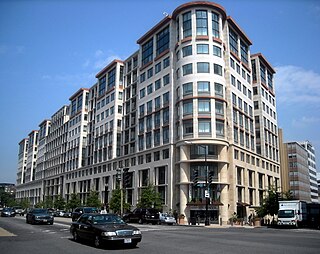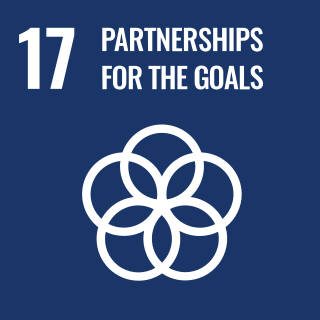The International Bank for Reconstruction and Development (IBRD) is an international financial institution, established in 1944 and headquartered in Washington, D.C., United States, it is the lending arm of World Bank Group. The IBRD offers loans to middle-income developing countries. It is the first of five member institutions that compose the World Bank Group. The initial mission of the IBRD in 1944, was to finance the reconstruction of European nations devastated by World War II. The IBRD and its concessional lending arm, the International Development Association (IDA), are collectively known as the World Bank as they share the same leadership and staff.

The International Finance Corporation (IFC) is an international financial institution that offers investment, advisory, and asset-management services to encourage private-sector development in less developed countries. The IFC is a member of the World Bank Group and is headquartered in Washington, D.C. in the United States.

The Overseas Private Investment Corporation (OPIC) was the United States Government's Development finance institution until it merged with the Development Credit Authority (DCA) of the United States Agency for International Development (USAID) to form the U.S. International Development Finance Corporation (DFC). OPIC mobilized private capital to help solve critical development challenges and in doing so, advanced the foreign policy of the United States and national security objectives.

The Global Environment Facility (GEF) is a multilateral environmental fund that provides grants and blended finance for projects related to biodiversity, climate change, international waters, land degradation, persistent organic pollutants (POPs), mercury, sustainable forest management, food security, and sustainable cities in developing countries. It is the largest source of multilateral funding for biodiversity globally, and distributes more than $1 billion a year on average to address inter-related environmental challenges.

The French Development Agency is a public financial institution that implements the policy defined by the French Government. It works to fight poverty and promote sustainable development. This public institution is active in Africa, Asia, the Middle East, Latin America, the Caribbean and the French overseas territories, where it finances and supports projects that improve living conditions for populations, promote economic growth and protect the planet.

The African Development Bank Group (AfDB) or Banque Africaine de Développement (BAD) is a multilateral development finance institution headquartered in Abidjan, Ivory Coast, since September 2014. The AfDB is a financial provider to African governments and private companies investing in the regional member countries (RMC).

Mahmoud Mohieldin, is an economist with more than 30 years of experience in international finance and development. He is the UN Climate Change High-Level Champion for Egypt. He is an Executive Director at the International Monetary Fund. He has been the United Nations Special Envoy on Financing the 2030 Sustainable Development Agenda since February 2020. He was the Minister of Investment of Egypt from 2004-2010, and most recently, served as the World Bank Group Senior Vice President for the 2030 Development Agenda, United Nations Relations and Partnerships. His roles at the World Bank also included Managing Director, responsible for Human Development, Sustainable Development, Poverty Reduction and Economic Management, Finance and Private Sector Development, and the World Bank Institute; World Bank President's Special Envoy on the Millennium Development Goals (MDGs), the Post-2015 Development Agenda, and Financing for Development; and Corporate Secretary and Executive Secretary to the Development Committee of the World Bank Group's Board of Governors. Dr Mohieldin also served on several Boards of Directors in the Central Bank of Egypt and the corporate sector. He was a member of the Commission on Growth and Development and was selected for the Young Global Leader of the World Economic Forum in 2005. His professional experience extends into the academic arena as a Professor of Economics and Finance at the Faculty of Economics and Political Science, Cairo University and as a Visiting Professor at several renowned Universities in Egypt, Korea, the UAE, the UK and the USA. He is a member of the International Advisory Board of Durham University Business School. He also holds leading positions in national, regional and international research centres and associations. He has authored numerous publications and articles in leading journals in the fields of economics, finance and development.
An international financial institution (IFI) is a financial institution that has been established by more than one country, and hence is subject to international law. Its owners or shareholders are generally national governments, although other international institutions and other organizations occasionally figure as shareholders. The most prominent IFIs are creations of multiple nations, although some bilateral financial institutions exist and are technically IFIs. The best known IFIs were established after World War II to assist in the reconstruction of Europe and provide mechanisms for international cooperation in managing the global financial system.

The Development Bank of Southern Africa (DBSA) is a development finance institution wholly owned by the Government of South Africa. The bank intends to "accelerate sustainable socio-economic development in the Southern African Development Community (SADC) by driving financial and non-financial investments in the social and economic infrastructure sectors".
The Climate Investment Funds (CIF) was established in 2008 as a multilateral climate fund in order to finance pilot projects in developing countries at the request of the G8 and G20. The CIF administers a collection of programs with a view to helping nations fight the impacts of climate change and accelerate their shift to a low-carbon economy. Through contributions from 14 donor countries, CIF supports more than 350 projects in 72 low and middle-income countries on the frontlines of the climate crisis.

Climate finance are funding processes for investments related to climate change mitigation and adaptation. The term has been used in a narrower sense to refer to transfers of public resources from developed to developing countries, in light of their UN Climate Convention obligations to provide "new and additional financial resources". In a wider sense, the term refers to all financial flows relating to climate change mitigation and adaptation.
The R20 – Regions of Climate Action is a non-profit environmental organization founded in September 2011, by former governor of California, Arnold Schwarzenegger, with the support of the United Nations. R20 is a coalition of sub-national governments, private companies, international organizations, NGOs, and academic & financial institutions. Its mission is to accelerate sub-national infrastructure investments in the green economy to meaningfully contribute to the Sustainable Development Goals (SDGs). The NGO operates at the sub-national level as R20 believes sub-national governments constitute a powerful force for change and are best positioned to take action & implement green projects.
Belgian Investment Company for Developing Countries (BIO), is a private company, based in Brussels, Belgium.

Daniel Fitzgerald Runde is a senior executive and strategist in international development, international trade, investment, global business and organizational change. Runde is the author of the book, "The American Imperative: Reclaiming Global Leadership through Soft Power."
Blended finance is defined as "the strategic use of development finance and philanthropic funds to mobilize private capital flows to emerging and frontier markets", resulting in positive results for both investors and communities. Blended finance offers the possibility to scale up commercial financing for developing countries and to channel such financing toward investments with development impact. As such, blended finance is designed to support progress towards the Sustainable Development Goals (SDGs) set forth by the United Nations. Meeting the SDGs will require an additional $2.5 trillion in private and public financing per year as of 2017 estimates, and an additional $13.5 trillion to implement the COP21 Paris climate accord. The concept of blended finance can contribute to raising the private financing needed. It was first recognized as a solution to the funding gap in the outcome document of the Third International Conference on Financing for Development in July 2015.
Singapore officially joined the International Bank for Reconstruction and Development (IBRD) on August 3, 1966 after Singapore's independence from Malaysia. By 1975, Singapore received 14 total loans from the World Bank, 10 of these loans were used exclusively for infrastructure projects. Currently, Singapore is a member of World Bank Group Institutions including International Bank for Reconstruction and Development (IBRD), International Finance Corporation (IFC), Multilateral Investment Guarantee Agency (MIGA), International Development Association (IDA), and the International Centre of Settlement of Investment Disputes (ICSID).

Vietnam joined the World Bank Group (WBG) on 21 September 1956. Before the mid-1980s, Vietnam was one of the world's least developed countries. A series of economic and political reforms launched in 1986, known as Đổi Mới, caused Vietnam to experience rapid economic growth and development, becoming a lower middle-income country. The World Bank (WB) has maintained a development partnership with Vietnam since 1993. As of 25 March 2019, it has committed a total of US$24 billion in loans, credits, and grants to Vietnam through 165 operations and projects, 44 of which are active as of 2019 and comprise US$9 billion. With an estimated extreme poverty rate below 3% and a GDP growth rate of 7.1% in 2018, Vietnam's economy continues to show fundamental strength and is supported by robust domestic demand and export-oriented manufacturing.
The Saudi Fund for Development (SFD) is a Saudi Arabian government agency that provides development assistance to developing countries by financing social and infrastructure projects. The fund seeks to support the economies of recipient countries by enhancing economic growth and promoting job opportunities. SFD was established in 1974 and began operations in 1975. SFD's activities include development, finance, trade, and funding. The fund is led by H.E. Mr. Ahmed bin Aqeel Al-khateeb who also serves as the Minister of Tourism for Saudi Arabia.

Sustainable Development Goal 17 is about "partnerships for the goals." One of the 17 Sustainable Development Goals established by the United Nations in 2015, the official wording is: "Strengthen the means of implementation and revitalize the global partnership for sustainable development". SDG 17 refers to the need for the nonhegemonic and fair cross sector and cross country collaborations in pursuit of all the goals by the year 2030. It is a call for countries to align policies.
Sustainable Development Goals and Lebanon explains major contributions launched in Lebanon towards the advancement of the Sustainable Development Goals SDGs and the 2030 agenda.











